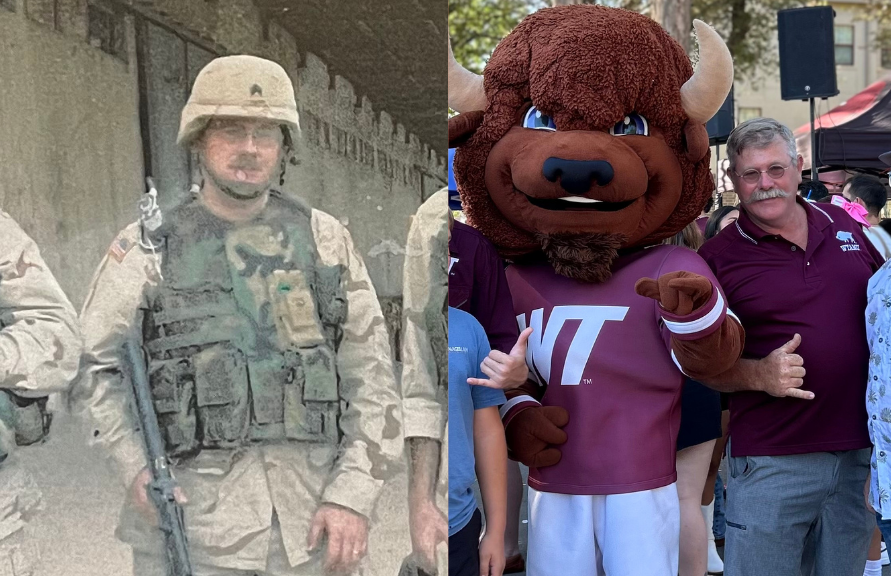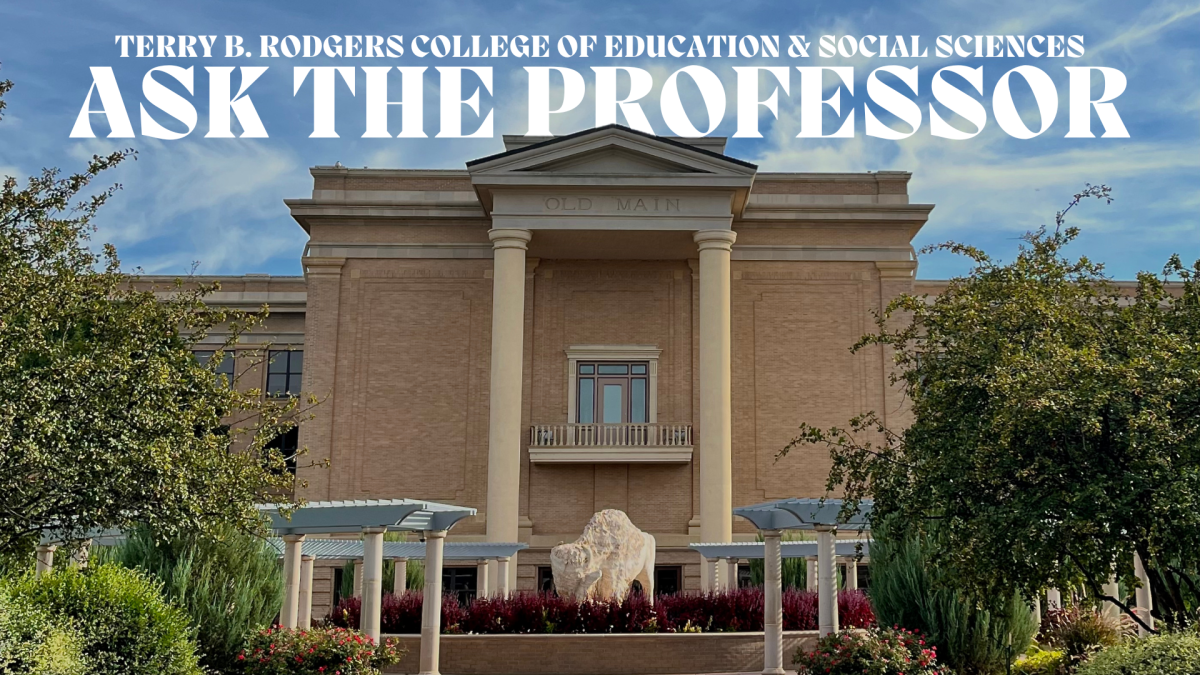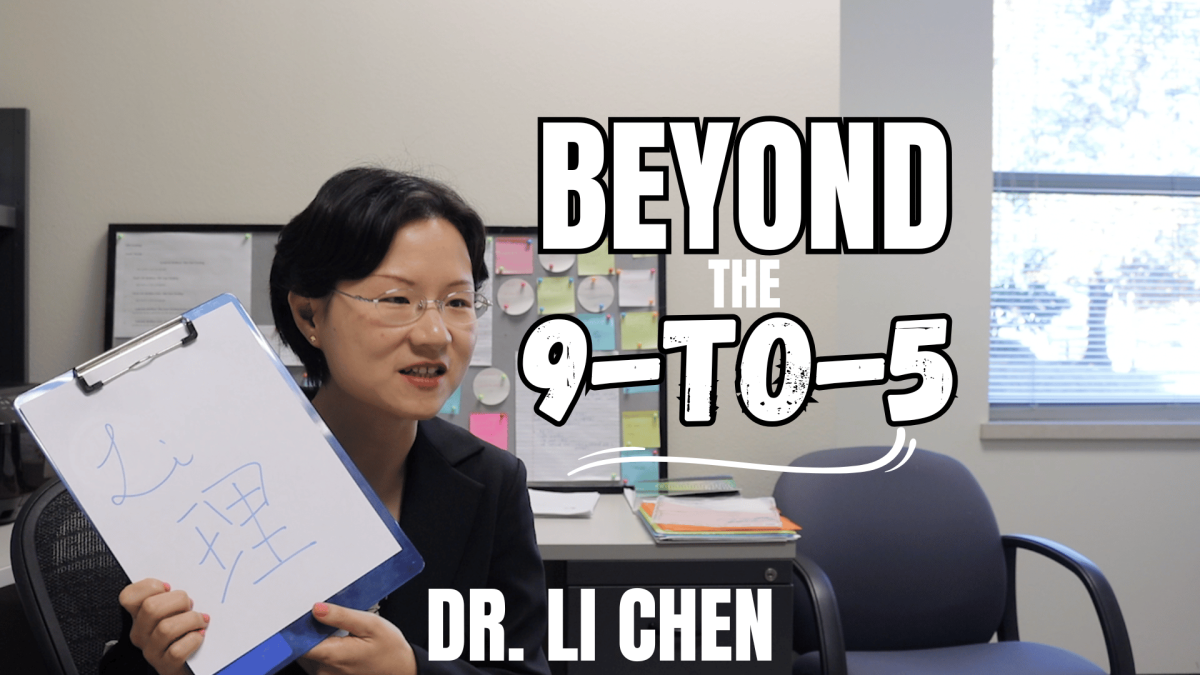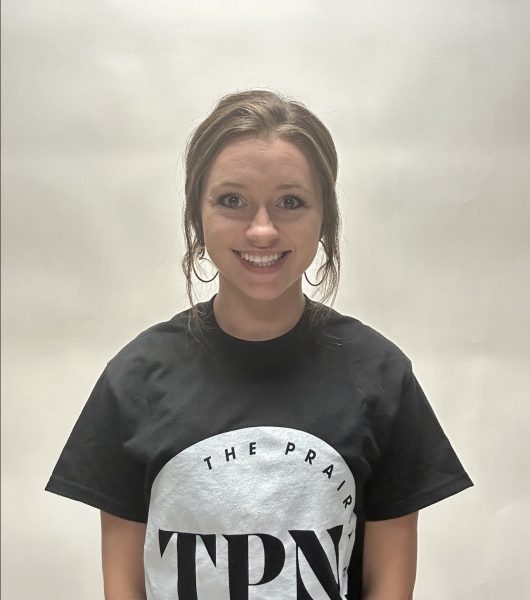Ben Osborn is a general studies major at West Texas A&M University and served in the U.S. Army from 1996 to 2005. After 23 years, Osborn returned to WT to finish school and is set to graduate next May.
Osborn grew up in Friona, started his career at WT as an animal science major in 1996 and met his wife at the dining hall on campus in 1999. While a student, Osborn made the decision to join the U.S. Army to help pay for tuition.
“My grandfather was in the Army, so I thought the Army was the way to go,” Osborn said. “Plus, a bunch of my friends were in the Army and they were the ones that said, ‘This’ll help you pay for school.’”
Many major world events would occur during Osborn’s time in the Army, including 9/11 and the capture of the President of Iraq, Saddam Hussein.
“It was a lot of training,” Osborn said. “I guess 6 months after 9/11, all we did was train. We didn’t know what we were training for, but we trained. They didn’t tell me when I joined that I’d be in a war.”
Osborn joined the Army Reserves, achieved the rank of Sergeant, and was deployed to Iraq for a year in 2003. He explained what it was like working in Civil Affairs in Iraq during this time.
“It was the 413 Civil Affairs Battalion out of Lubbock,” Osborn said. “So we help get their infrastructure back and going. We were integrated with the infantry; they blew it up, we tried to fix it. We were trying to win the hearts and minds of the people. If they needed food, we tried to get them food.”
Osborn told about the U.S. troops that he worked with during his time in the Army.
“The 101st Airborne, that’s who I was attached to,” Osborn said “They were younger than me, but they were full-fledged infantry. My unit was comprised of teachers, policemen, people who had a job outside the Army.”
Even being in a foreign country, across oceans and thousands of miles away from his home and family, there was still a familiarity and a common ground between Iraq and the dusty Texas Panhandle, and that was agriculture.
“Since I was raised in the panhandle and was a part-time farmer, I got to deal with the farmers,” Osborn said. “They had lots of hostility, but if I went out in the rural areas and we started talking about farming, I got along good with them. Out in the country, there were different, different kinds of people, they were more friendly. And if you were going to help them, they took it.”
Born and raised in the Panhandle of Texas, where agriculture is a way of life, Osborn helped bring knowledge and aid to the Iraqi farmers while his MOS, or Military Occupational Specialty, was in Civil Affairs.
“We worked with the United Nations getting flour mills running that hadn’t been running since the 1970s,” Osborn said. “There were lots of generators, sprinkler systems just like how you see in the panhandle. Tons of those were brought in there to help them be more self-sufficient. We got the elevators back and going so that they could store their wheat and sell it. I got to do a lot of neat stuff that the ordinary soldier didn’t get to because my MOS was 38 Alpha. It’s my specialty. It’s Civil Affairs.”
Osborn explained how the U.S. Military helped improve the farming practices in Iraq.
“We got their Minister of Agriculture, and we worked out a deal and got him sent up here to Kansas State for like six months, almost half of my tour,” Osborn said. “To learn about new farming, new seeds. And then we went into Kurdistan; we had helped the Kurds back in the Gulf War, so they were further advanced. They were using our practices. So we would go up there and take those agricultural people that were in charge of the farmers, and we’d take them newer seeds that were bred in Jordan or Egypt, and so we got them new, better seeds. And then we started coordinating with other government entities to get fertilizers brought in.”
However, even with having some commonalities between the Iraqi farmers and Osborn’s farming background, there were still vast differences in the way of life between each country.
“They had combines, but they still farm like our grandparents and great-grandparents farmed,” Osborn said. “Small plows, they still use donkeys, horses; I mean, they were pretty far behind. They don’t have infrastructure like we have. Electricity, electric lines, telephones lines — they have some but not enough.”
Osborn shared one particular experience on how they ensured that the Iraqi farmers got paid for their crops.
“They found all this money in Saddam Hussein’s house down in Baghdad somewhere,” Osborn said. “We were trying to figure out how to pay the Iraqis for their wheat. It was 8 million dollars in duffel bags. And it was all American $100 bills. It took two people per bag, and they were heavy to get them and throw them in the Humvee. We got it done, we got it loaded, we went to the bank that they were going to store it, and we were trying to get the president of the bank to sign for it. Well, one of the duffle bags had busted opened and some of them money that was in $10,000 increments was loose. He wouldn’t sign it. We said, ‘If we count it, will you sign it?’ and he said, ‘Yeah, if it’s all there, I’ll sign it.’ So we went down to the basement, and we dumped it all on the floor, that one duffle bag that was busted. We didn’t know the sun went down and came back up. We were probably there for 36 hours, counting that money, four of us. And that’s what they paid the farmers for.”
Osborn talked about the incredible sacrifices and hardships he experienced while being deployed to a warzone for a year.
“I was scared,” Osborn said. “In the military, you’re fighting for freedom, but you have no freedoms. I got good at watching people and got good at finding roadside bombs. That’s why I still have all my digits. I didn’t shower because there was no water. You carried your weapon everywhere, 24/7. Sundays were just another day. You didn’t go to church because you had things to do.”
During his time on deployment, the president of Iraq, Saddam Hussein, was captured.
“They locked us down and wouldn’t let us go out on missions,” Osborn said. “Anyway, we had to do a mission because the General ordered it. So we went out, and we got shot at a bit.”
Osborn also described the towns in Iraq, and the customs of the local people, and the keepsakes they gave him as a sign of their appreciation.
“Most all of them are dirty; just certain parts in that town were clean, and that’s where the Christians were,” Osborn said. “You know the World War II movies, where they’d liberate a town and give you flowers? I got a teapot. I still have it. I’ve got some rings and some pennants. For the majority of them, they were very nice.”
During his time being deployed overseas, Osborn was married and had a son who, at that time, was over a year old.
“The biggest challenge of being deployed was being away from the family,” Osborn said. “I mean, it wasn’t so bad being deployed because you knew that’s what you signed up for. But like Christmas or Thanksgiving, those memories of hanging out, and you’re not getting to do that.”
Currently, two of Osborn’s children also attend WT, and he explained how they encouraged him to go back to college to finish his degree.
“It’s funny because Madison and Sloan, who are going here right now, pushed me to go back,” Osborn said.
Sadly, like a lot of veterans, their hardships and struggles don’t automatically stop when they come back home.
“There were quite a few times thunder reminded you of something blowing up, or firecrackers kinda make you jump,” Osborn said. “You were always on guard defensively when you didn’t really have to be. Because you were still in that mindset; Something happened you’d reach for a weapon that you no longer have in your possession. I guess when I got back, it was ten years before I came to Amarillo. I just stayed out of big cities. Over there, they would gather up, and usually something bad was going to happen.”
Osborn retired from the Army in 2005 and is currently the assistant to the ag teacher at Vega High School.
“I was in till they opened the window to let me out,” Osborn said. “I got out; I didn’t want no more.”
Osborn had many experiences that most people who were never in the military do not have. And with that came new appreciations throughout our everyday lives that are easy to take for granted.
“I did something for my country,” Osborn said. “I don’t know how to explain it. And I’d do it again. That’s crazy. As much as I hated it, I’d do it again. To me I think it’s the most honorable thing I did. I did something for my country. Because everything it does for me, especially after seeing how other countries, third world countries live. I mean, we’ve got it made in the shade; even when it’s bad here, it’s not bad.”










